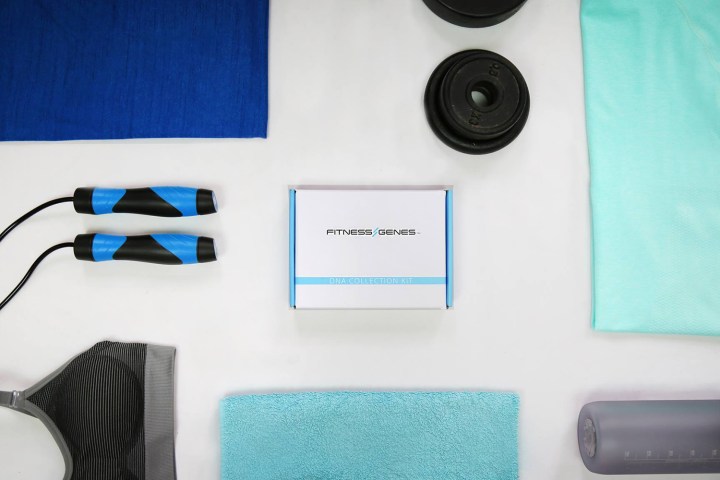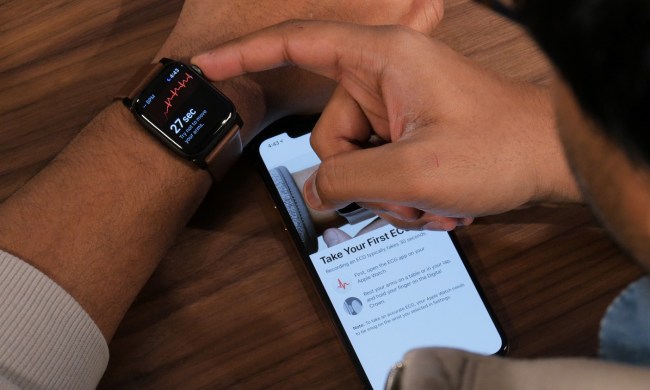
And yet, Reardon – founder and CEO of UK-based personal genomics company FitnessGenes – consistently finds the energy to travel across the globe, speak at wellness conferences, and give cheerful interviews to faraway journalists.
He credits the FitnessGenes programs, where he was “the original guinea pig,” for improving his exercise habits and his diet, allowing him to continue his self-described “ridiculously busy” lifestyle. FitnessGenes’ genetic sequencing laboratory tests for variations in your genetic code to determine how your body responds to exercise and nutrition.

It works a lot like some of the other DNA-analysis services do. You start by signing up for a plan on the FitnessGenes website – the company offers basic “starter” plans, as well as plans tailored to help you build muscle or lose weight – and, in a few days, a DNA testing kit will arrive in the mail.
Inside this kit, you’ll find a DNA sampling kit. Just pop it open, deposit some saliva into the receptacle (so, spit into the tube), reseal the package, and send it back to FitnessGenes’ testing facility in Oxfordshire, where a team of geneticists will analyze the data and deliver a breakdown of your genetic variations, complete with a personalized workout and diet plan built to utilize your body’s strengths and avoid its weaknesses.
You don’t need to know how to interpret genetic data in order to benefit from it.
Currently, the company tests for 43 different genetic variations – single nucleotide polymorphisms, or “snips,” colloquially – each with a different, tangible effect upon the body’s response to exercise and nutrition. The snip known as CKM, for example, is an enzyme that influences energy production, and your CKM genotype can determine if you’re better suited for endurance workouts or interval strength training. Another snip, known as FTO, influences food cravings, and carriers of a certain FTO genotype are predisposed to eat more and feel hungry sooner after eating.
Reardon says that the company’s dedication to evidence-based, peer reviewed science and academic collaborations will soon result in more genetic information availability for the consumer; it’s only a matter of time before more genetic variations can be tested.
But what exactly do you do with this genetic information once you have it? According to Reardon, one of the biggest advantages of having information like this is the boost it provides to nutritional and physical efficiency. Armed with knowledge of the systems at work inside your body, you can tailor workouts and meals to save time and eliminate anything that doesn’t help you reach your goals – whatever they may be.
That said, FitnessGenes recognizes that most people aren’t genetics experts, and wouldn’t be able to translate DNA sequencing results into a workout plan all by themselves. So, to make this information easier to digest, the company provides access to a members-only webpage, where you can learn about each of the most important 41 gene variations and find out how many copies of each allele are stored in your genes. In the “Action Blueprint” section of the site, FitnessGenes offers workout recommendations (with different levels of detail for beginner, intermediate, and advanced athletes) based upon the sequencing results.
In other words, a FitnessGenes membership could provide a new angle for those unable to find success working with traditional trainers and nutritionists. “One of the most valuable benefits of having this information is psychological,” said Reardon. “People become demotivated very quickly, because they’re not empowered by the information they’re receiving through generic approaches to training and nutrition. When you have specific frameworks based on your DNA, [from a psychological perspective] that’s very motivational.”
FitnessGenes certainly isn’t the first company to experiment with personal genomics testing. 23andMe –the startup that pioneered the mail-in DNA sequencing model– provides full, uninterpreted genetic data that sheds light on your inherited traits and genetic predispositions. In 2012, Ancestry.com launched a DNA testing service geared toward helping people learn more about their heritage and connect with distant relatives. There’s even a company called uBiome that will analyze the DNA of your gut bacteria and tell you which species live inside your body.
Products and services based on DNA analysis aren’t necessarily a new idea, but FitnessGenes has carved out a niche for itself by taking it a step beyond analysis and providing “action upon results.” There are a few other fitness-focused genetics services out there right now, but only FitnessGenes prepares clients with personalized fitness and nutrition programs. It’s a strategy that’s becoming more commonplace in the genomics field, and one that’s helping push the industry into the mainstream sooner than later.
The big takeaway here is that genetic analysis is rapidly being democratized. You no longer need to own expensive lab equipment, or know how to interpret genetic data in order to benefit from it. Thanks to a growing number of startups and services that will do all the heavy lifting for you, DNA sequencing is easier and more accessible than ever before.
Though it’s always difficult to predict the paths of new technologies, the genomics industry seems destined for a bright future. “Commercialization of genomics is going to change the lives of the vast majority of the people on Earth,” said Alec Ross, former senior advisor of innovation to Hillary Clinton, in a February interview. “The last trillion-dollar industry was built on computer code. The next will be built on genetic code.”





